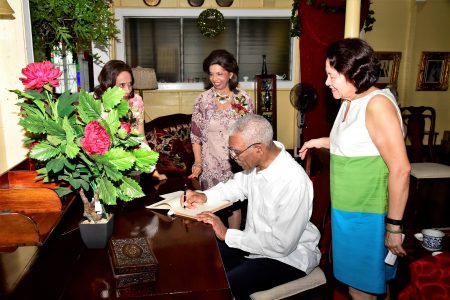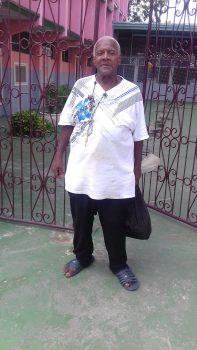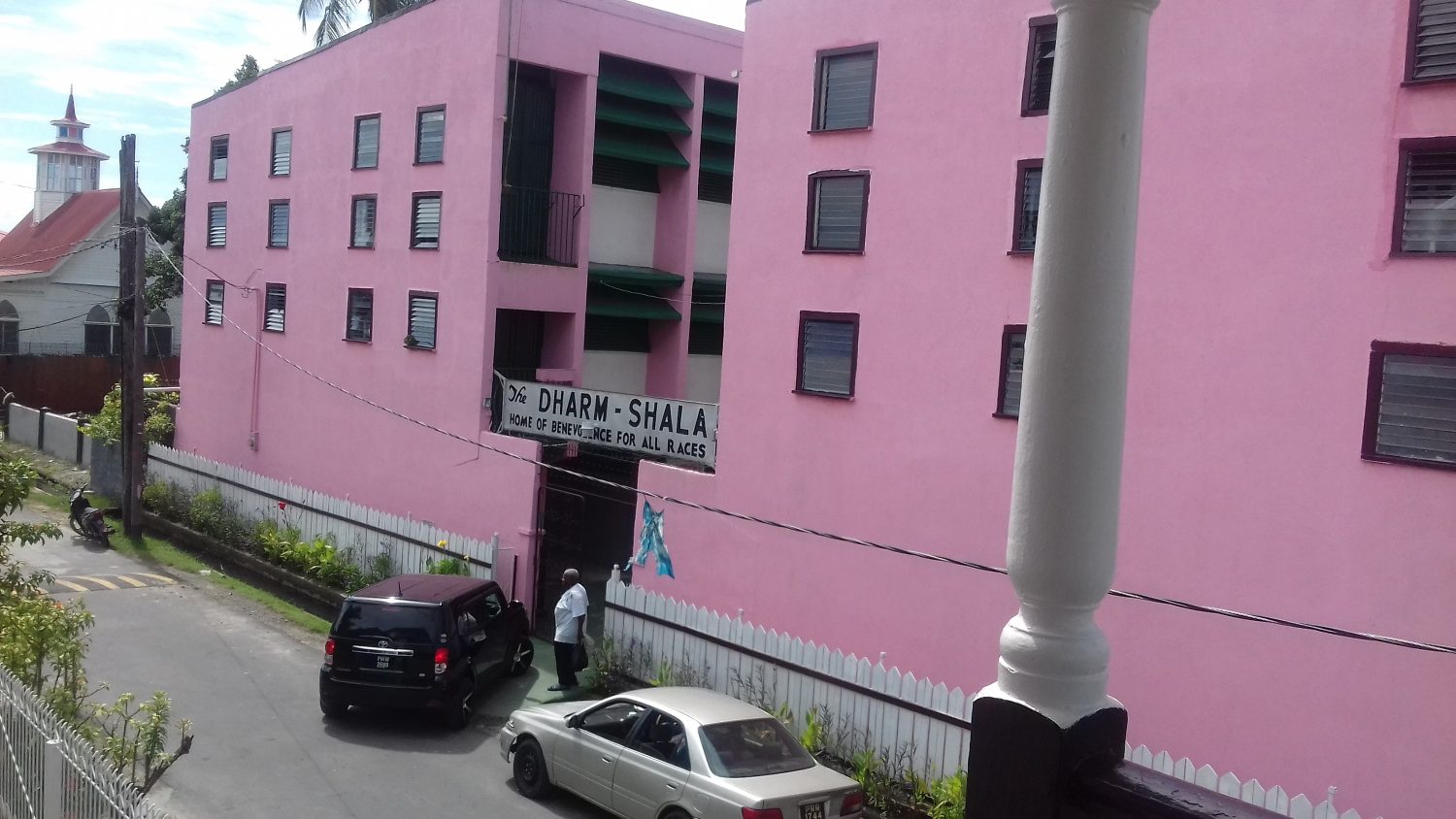Several peeled bulbs of garlic lay on the counter before him and as he was in the process of peeling more, he briefly took his eyes away from the task to address this reporter.
“Good morning ma’am how can I help you?” he asked and following my answer, “Okay, let me escort you.”
His name is Rensford Rodney and he is a resident at the Dharm Shala located in Albouystown and according to him, first cousin of the late historian, political activist and scholar Dr Walter Rodney.
He is 70 years old and has been living at the home for the last 13 years. He laughingly said that he will live for another 70 because he has “the secret…eat well and exercise.” He is not the cook, but he assists when the cook is off.
After a short conversation with Rodney, it is clear that he is well schooled and speaks about working in the US and having worked at several places in Guyana. He is unable to chronologically articulate his journey to the Dharm Shala but said he was taken there by employees of the Mayor and City Council after he was found living on the streets.

“I love to write, and I have been corresponding with my brother in the US. He wrote me a letter over the holidays and I must respond. He is retired now, and some say I should be living in the US, but I love it here, I am not sorry I am here,” Rodney told the Sunday Stabroek recently.
Kella Ramsaroop is the Managing Head of the home, which also has a branch in Berbice. She said that Rodney is just one of the many residents who at some time in the past, may have led a life that many envied but somehow fell on tough times.
They are not all happy campers but Kella does not like to dwell on this, rather, she and her sister Pamela Ramsaroop, Vice President of the Dharm Shala, with support from their two other siblings who live overseas are focused on continuing the work of their now deceased father Harisaran Ramsaroop.
The late Ramsaroop continued the work of his father Pandit Ramsaroop who started the Dharm Shala in 1921 (in April it will be 98 years) with the aim to feed, house, clothe and to look after the social, religious and medical needs of the needy.
A citation on a plaque displayed in the pristine Victorian white wooden house located on King Edward Street, Alboystown, which is opposite the Dharm Shala home, states that Pandit Ramsaroop, “sacrificed his life for the destitute, maimed and poor of all races.” The pandit was a jeweler, according to his granddaughter, and he used his money to start the Dharm Shala. At first it was a soup kitchen and later a kindergarten school and temple at the Albouystown location. The school building is still there and the Ramsaroops hope that one day that it will be re-opened; it was closed by the then government in the 1970s.

For Kella, the words of the late Bishop Randolph George during a function at the home, aptly describes the situation under which they operate.
She recalled that he said the Dharm Shala takes care of “…desperate dangerous people but the work continues…”
The residence is in one of the most underprivileged communities in Georgetown, which is also a haven for criminal activities and while the Ramsaroops would have had their fair share of unpleasant experiences, Kella once again declined to focus on this. She did, however, point to the high fence that she eventually had erected over the misgivings of her father, who would have preferred a “picket fence”; she admits the situation had become dangerous.
“This is Albouystown…, but this is the sacrifice we have made, we don’t have to be here, but we want to be here,” she said in an hours-long conversation with this newspaper.
Her father was 35 years old when he took control of the home and Kella said he rebuilt most of the wooden buildings because by then they had become somewhat derelict.
Magistrate and secretary
As dangerous as it is Kella, who could have been living in the US and kept the home open with hired help, prefers the “hands on approach” and being on ground to ensure that the residents are given the best care affordable. Her father and grandfather would not want it any other way.
She spoke about some of the residents who have passed through the home and some who are still there. While many resist at times and the encounters are not always pleasant, she takes it all in stride.
She recalled that a former magistrate was once a resident at the home much to the shock of many who visited as they knew of his background and that he had children who were professionals overseas.
Her mom Ann Callia Ramsaroop, who Kella described as coming from a well-to-do family in Berbice, knew the magistrate and the standards to which he was once accustomed, and she ensured that her maid went over to assist him.
“I remember when I was walking down the stairs going to work in the morning he would be at the gate calling out the numbers of police ranks as if he was on the bench,” Kella recalled.
And then there is the “beautiful woman who was once the personal secretary to a government minister” who has been a resident of the home for the past 30 years.
As Kella tells it, one day her father was walking along Sussex Street when he noticed a “beautiful young girl siting on a tomb” in Le Repentir, which is adjacent. He questioned her presence there and she indicated that she was hungry. He directed her to the Dharm Shala and she has never left.
“Many people would come, and they would be shocked when they see her now as she has gotten old. But even now when you interact with her she is just different, the way she sits and walks upright,” Kella said.
She has mental-health issues—like about four other residents—but she is harmless.
“Not everyone is caring, you have people and then there are people,” Kella said as she attempted to explain how some persons from prominent family backgrounds end up in the home even though they have relatives.
According to Kella, they try to have social activities for the residents and they would from time to time be invited out and even though there is a chapel and Hindu temple available, persons would still come and pray for the residents. They also have access to radio and television. While some live in a dormitory setting in the building, others, because of their mobility, have their beds downstairs underneath the building.
At present, there are about 30 residents but daily, persons also visit the home for meals and they are not turned away.
While the Dharm Shala receives a monthly subvention from the government of $1 million, Kella said much more is needed to run the two homes; she and her sister must come up with millions more. Their work (Pamela is a lawyer and does all the secretarial work) is voluntary but they have employees who are paid a stipend.
She boasted that every cent is accounted, and the books are audited in May of each year.
They try not to turn away persons, but Kella said they cannot take persons who cannot help themselves since they do not have staff to give round-the-clock care, nor do they have a nurse or any medical personnel on call. There is a dispensary which is visited monthly by officials of the Ministry of Health.
“So, everyone who comes, I have to see them first before they are accepted because we can’t take persons who can’t help themselves,” she said.
When a resident dies, the police are called, and the government stands the burial cost for that person.
“Some of them live for about 40 years here. A lot of them are from good families, they are not street urchins,” she noted.
Confidential secretary
Kella shared that while she and another sister were born in Berbice, the family later moved to the Albouystown location where her other sisters were born.
“Our whole life we grow up here, we would have had spells overseas, but this is our home,” Kella said sharing that Pamela now lives between here and the United Kingdom.
All four of the sisters attended what was then known as the St Joseph school in Charlestown which was run by nuns and given a chance Kella would regale anyone who would listen with story after story about how exceptional the school was.
She also has fond reminisces of her “beautiful” mother who died in 1990.
For 20 years, Kella was a confidential secretary at the then Barclays Bank in Guyana, but she later migrated and worked for about five years in the US. It was while she was there that she got a call to come home.
She arrived just a few hours before her mother’s shocking death and decided to remain with her father because she wanted the family’s work to continue and knew he needed the assistance.
Her father’s death in 2013 was another shock for Kella. She said the deaths of her parents were the two most “shocking experiences of my life because nothing prepared me for their deaths.”
Kella shared that she has been associated with charity work for all her life and as a child it was driven by both of her parents.
She knows that one day she and Pamela will be no more, and she believes that her nieces, nephews, great-nieces and great-nephews will keep the home open, but they will not have the hands-on approach as they do not reside in Guyana and will have to hire persons for the day-to-day running of the homes.
But for now, Kella will continue the work and as much as possible provide the food, clothes and shelter to those in need.
For Rodney, the Dharm Shala will be his home for the next 70 years—so he believes—and his only grouse as the assistant cook is the fact that the home does not have a deep freeze facility, nor does it have a big pressure cooker so “that you can get your dhal in half an hour.”
But he enthused, “I enjoy here. I don’t want to leave. I love reading Stabroek News especially on Sunday, you know, I like to read Al Creighton and Ian Mc Donald.”









